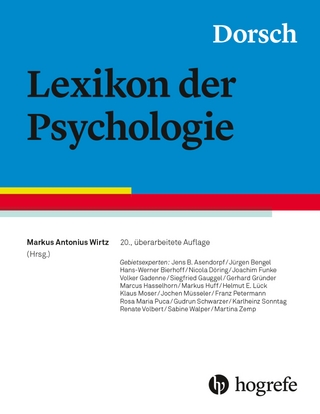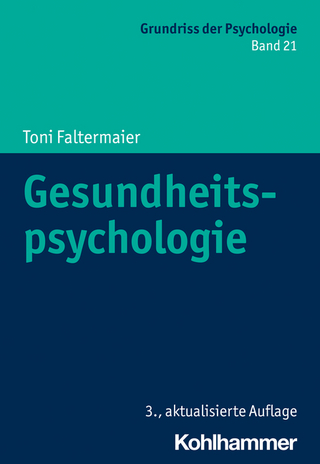
Thinking Critically About Child Development
SAGE Publications Inc (Verlag)
978-1-5443-4193-4 (ISBN)
With a unique focus on inquiry, Thinking Critically About Child Development presents 74 claims related to child development for readers to examine and think through critically. Author Jean Mercer and new co-authors Stephen Hupp and Jeremy Jewell use anecdotes to illustrate common errors of critical thinking and encourage students to consider evidence and logic relevant to everyday beliefs. New material in the Fourth Edition covers adolescence, adverse childhood experiences, genetics, LGBT issues for both parents and children, and other issues about sexuality, keeping readers up to date on the latest scholarship in the field.
Acknowledgments
About the Authors
Introduction
What Is Critical Thinking?
How Do You Think Critically?
Fallacies to Watch for When Studying Child Development
Claims About Child Development
Types of Mistaken Claims
“Seductive Ideas”
Why Is It All So Complicated?
Understanding Basic Facts
Values and Political Goals
Variations on the Developmental Theme
Examining the Evidence: Recognizing That a Belief May Be Mistaken
Sources of Information: Safe or Sorry?
The Work Ahead
What Difference Does It Make If You Can or Can’t Think Critically About Child Development?
Part I: Genetics and Prenatal Life
Claim 1: Genetic factors play such a strong role in human development that genes alone can determine certain human behavioral characteristics.
Claim 2: Although prematurely born babies are smaller than most and may need special medical care, the babies and their parents instinctively know how to interact with each other.
Claim 3: If a child’s problem is genetically caused, the problem will be present at birth and will stay the same throughout life.
Claim 4: Unborn babies are not influenced much by the environment outside the mother’s body.
Claim 5: As the date when her child will be born gets closer, a mother-to-be needs to be more careful about alcohol and drugs because the risk of birth defects increases throughout pregnancy.
Claim 6: Assisted reproductive technologies (ART) offer reliable ways for couples to have healthy children in spite of fertility problems.
Claim 7: Genetic relationships are a powerful factor in social and emotional interactions, so people recognize and are attracted to blood relatives even if they have never met them before.
Claim 8: Babies work hard to be born.
Claim 9: When a baby has genetic problems, there are no pre- or postnatal methods for treatment.
Claim 10: Except for their reproductive organs, there are no differences between boy and girl babies before or soon after birth. Gender differences occur as a result of different experiences for boys and girls.
Part II: Infants and Toddlers
Claim 11: There are ideal natural ways for human beings to give birth and to care for young babies, and methods that are too different from the natural ways are not desirable.
Claim 12: Parents need to have contact with their babies right after birth so that they can bond with them.
Claim 13: Babies are born with emotional attachments to their mothers and can recognize their mothers at once.
Claim 14: When mothers of young babies are depressed, the problem is caused by the changes in hormones they experience after the birth.
Claim 15: It’s been proved that it’s always better for parentless children to be placed in foster care rather than in orphanages or other institutions.
Claim 16: A baby’s sleeping position can cause or prevent sudden infant death syndrome.
Claim 17: The benefits of bed sharing with an infant outweigh the risks.
Claim 18: Parents should not talk baby talk to their children because it slows their language development.
Claim 19: Being exposed to two different languages is confusing for babies and interferes with normal language development.
Claim 20: Babies and toddlers benefit a great deal from being taught sign language.
Claim 21: It’s a problem, and possibly means autism, if babies don’t make eye contact in the first few weeks of life.
Claim 22: It’s harmful to preschoolers’ psychological development if they make overnight visits to estranged parents.
Claim 23: Toddlers drop food on the floor because they want to make their parents angry.
Claim 24: It is important for parents to work with babies and teach them how to walk.
Claim 25: It is a good thing for an infant or a toddler to have experience with many caregivers, not just one or two.
Claim 26: Screen devices provide excellent resources for encouraging infants’ and toddlers’ mental development.
Claim 27: Using cellphones is an important skill for children growing up today, and beginning early is the best way to ensure good development and ability to use electronics.
Claim 28: People who were abused as children are likely to abuse their own children.
Part III: Preschoolers
Claim 29: Having kids listen to Mozart makes them smart.
Claim 30: The time between birth and age 3 years is the most important period of development and learning in a person’s life.
Claim 31: Children need to hear frequent praise in order to be motivated toward work and achievement.
Claim 32: Children need to develop basic trust and show it by their confidence in other people.
Claim 33: If a child is able to complete a task with an adult present, he or she is also able to do it alone.
Claim 34: Preschoolers who hold their breath when angry are trying to upset their parents and get their own way.
Claim 35: Vaccines and heavy metals cause autism.
Claim 36: Autism rates are rising rapidly, especially in certain parts of the country, so something must be happening to cause more cases of this serious developmental problem.
Claim 37: Preschool children who lie are developing along dangerous lines and need to be corrected severely in order to stop this bad behavior.
Claim 38: Preschoolers who try to bargain with their parents really want to manipulate and control adults, and they should not be allowed to negotiate.
Claim 39: A young child can tell when someone is just teasing.
Claim 40: Children with attachment disorders must be treated very sternly and differently from typically developing children—even in ways that are ordinarily considered abusive.
Claim 41: Spanking should never be used to discipline a child because it is ineffective and causes children to model the aggression they experience.
Claim 42: Time-out is harmful to children.
Claim 43: When young children have traumatic experiences, their reactions are much like those of traumatized adults.
Claim 44: Serious mental illness and criminal behavior are caused by traumatic experiences in early childhood.
Part IV: School-Age Children
Claim 45: Girls who get their first period early are also likely to mature quickly in other ways.
Claim 46: Children have different learning styles, depending on whether they are left brained or right brained.
Claim 47: It’s healthy for children to be a little on the chubby side.
Claim 48: Birth order is an important factor that determines children’s intelligence and personality.
Claim 49: When a child is mentally ill, any psychological treatment is better than no treatment.
Claim 50: Bullying is a natural behavior for children, and there’s nothing you can do to stop it.
Claim 51: Sugar is a major cause of hyperactive behavior.
Claim 52: Adopted children have many more social and emotional development problems than do nonadopted children.
Claim 53: Adopted children usually turn out to be a lot like the parents who adopt them.
Claim 54: If a child is sexually molested, he or she will probably repress the memory.
Claim 55: Children raised by same-sex couples are disadvantaged compared to other children.
Part V: Adolescents
Claim 56: Regular experience of shared family meals is critical for children’s academic and behavioral development.
Claim 57: Self-help websites are useful resources for teens with eating disorders.
Claim 58: Children are more likely to become delinquent if their fathers are absent or uninvolved.
Claim 59: Violent television programs and video games cause increased aggressive behavior.
Claim 60: If parents are not strict enough, children will behave badly and may become criminals.
Claim 61: High self-esteem makes children perform better in school.
Claim 62: Single-sex schools give better outcomes of academic achievement than do coeducational schools.
Claim 63: The DARE program is an effective way to prevent children and adolescents from dealing or using drugs.
Claim 64: Texting and driving is a bigger problem for teenagers than any other age group.
Claim 65: Children and adolescents learn bad behavior from their peers.
Claim 66: Young teenagers should be tried and sentenced as adults if they commit serious crimes.
Claim 67: Adolescence is an emotionally dangerous time when teenagers are likely to attempt or commit suicide.
Claim 68: Punishment is an effective way to change children’s and adolescents’ undesirable behaviors.
Claim 69: Children are reaching puberty earlier with each generation.
Claim 70: Adolescent sexual activity is increasing.
Claim 71: Psychological treatments like “conversion therapy” can change a person’s same-sex orientation to a heterosexual orientation.
Claim 72: LGBT teenagers are more likely to commit suicide than other people.
Claim 73: Adolescents are more likely to have sex when they learn about contraception.
Claim 74: Adolescence comes to an end when teens turn 18.
Afterthoughts
Index
| Erscheinungsdatum | 15.03.2019 |
|---|---|
| Verlagsort | Thousand Oaks |
| Sprache | englisch |
| Maße | 152 x 228 mm |
| Gewicht | 700 g |
| Themenwelt | Geisteswissenschaften ► Psychologie ► Allgemeines / Lexika |
| Geisteswissenschaften ► Psychologie ► Entwicklungspsychologie | |
| ISBN-10 | 1-5443-4193-8 / 1544341938 |
| ISBN-13 | 978-1-5443-4193-4 / 9781544341934 |
| Zustand | Neuware |
| Haben Sie eine Frage zum Produkt? |
aus dem Bereich


